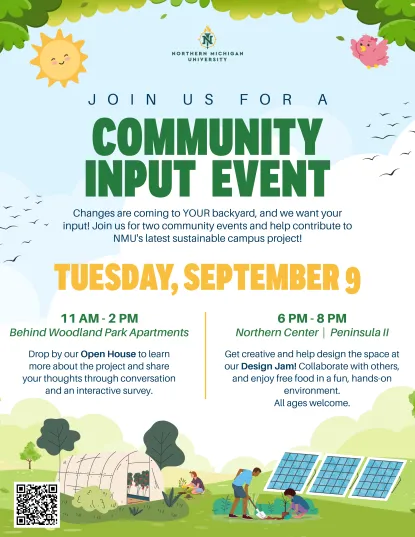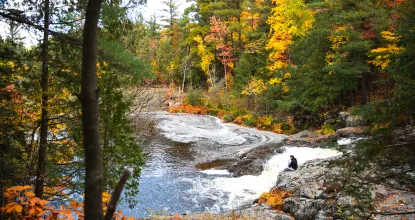Sustainability Demonstration Area
Imagine an interactive garden, a forest path, an outdoor learning area, and a place to learn about permaculture and compost. All just steps away from your dorm, apartment, or home. This is NMU's latest sustainability project.
Project Objective: To develop an experiential learning forest and garden just steps from the heart of campus.
Strategic Doing Project led by NMU’s Sustainability Advisory Council’s Strategy Team with the NMU Hoop House; Center for Native American Studies; Earth, Environmental, & Geographical Sciences Department; NMU Food Pantry; People, Culture, & Wellbeing; NMU Facilities; and SHINE.
Vision

Introduction
In NMU’s strategic guiding document, Our Compass, three Grand Challenges are presented to support our people, partner with our place, and realize the potential of all of our students. Embracing the Okanagan Charter and its Calls to Action, along with our commitment to honor and nurture the role of Indigenous perspectives and peoples is foundational to the demonstration site area. The project establishes a space to learn about sustainable food systems, explore a sensory and healing forest path, and practice care for all species.

Project Proposal
At the corner of Norwood and Neidhart avenues, adjacent to the University’s Woodland Park Apartments, on just over 10 acres of natural succession forest, this sustainability space will be a hub for students, faculty, staff, and community members. See satellite image for boundaries of the proposed space. The area could include:
- Hoop Houses
- Compost Demonstration Site
- Indigenous Medicine Garden
- Seed Library
- Herb Spirals
- Permaculture
- Pollinator Gardens
- Outdoor Classroom
- Sensory and Healing Forest Path
- Interpretive Signs

Community Engagement
NMU is nested within a regional food desert, affecting students and community members. The hope is for this space to be a demonstration site for campus and community participation in building a local, sustainable food system. From seed to produce, to composted materials for the next year’s crop, this area will showcase a variety of resilient food growing, harvesting, and processing methods. As we continue planning, we would love to hear your input!
Let us know your thoughts via this survey or by emailing us at shine@nmu.edu
Updates

Fall 2025
Help Shape the Future of NMU's Sustainability Space!
As we continue planning for the future of this park, we invite students, staff, and community members to share their ideas and feedback at our upcoming community events. Your input is essential—the decisions we make today will shape this space for years to come, and we want to ensure it reflects the needs and vision of our community.
Join us on Tuesday, September 9, for two engaging events:
Open House
📍 Woodland Park Lot
🕚 11:00 AM – 2:00 PM
Drop by to learn more about the project, speak with planners, and share your thoughts through conversation and an interactive survey.
Design Jam
📍 The Northern Center | Peninsula II
🕕 6:00 – 8:00 PM
Get creative and help design the space! You'll hear more about current ideas, collaborate with others, and enjoy free food in a fun, hands-on environment.
Come to one or both events—everyone is welcome! Bring your kids, invite your neighbors, and be part of shaping a space that truly serves our community.
Summer 2025
Planning for this park is well underway, and visible changes are beginning to take shape across the site. Throughout Summer 2025, several exciting developments are enhancing the space and its connection to campus sustainability efforts.
Solar Panel Relocation: The solar panels formerly located behind the SHINE building on Presque Isle Avenue have been successfully relocated to the Woodland Park lot. These panels now help power the Woodland Park Apartments, supporting NMU’s commitment to renewable energy.
Hoop House Expansion: Thanks to funding awarded to the NMU Food Pantry by the Michigan Hunger-Free Campus Pilot Program, NMU has acquired two new hoop houses and materials for the Construction Management program to build ten raised garden beds. These additions will support food security initiatives and hands-on learning opportunities.
Looking Ahead: Installation of the new hoop houses is expected to be completed by the end of September.
Stay tuned for more updates as we continue to transform this park into a vibrant, sustainable, and inclusive community space.

In the News
The sustainability demonstration area project plays a significant role in shaping both our campus and the broader community. As planning and implementation move forward, maintaining transparency through regular media coverage is essential. Below, you'll find a selection of interviews and news segments highlighting recent developments and community perspectives related to the project.
History of Agriculture at NMU
Excerpt from "A Sense of Time: The Encyclopedia of Northern Michigan University" (1999)
Pages 100-102
Russell M. Magnaghi
As early as 1905, courses in Agriculture were taught through the Biology Department and as special courses. Samuel D. Magers, Dr. Elliott Downing's successor in the Biology Department, was given the responsibility for developing a course that would teach Northern students to assist their pupils in planting and cultivating school gardens and beautifying the areas around their homes. Members of his agriculture classes planted gardens with regular and experimental crops and supervised the children in the training school in planting flowers and vegetables. He told The Quill reporter in November 1914, that "I shall refuse to pass any girl who fails to develop blisters on her hands." The school garden at this time was located to the southwest of Cohodas in the vicinity of Kaye Avenue. It was removed in 1922 with the construction of John D. Pierce School.
In 1912, the State Board of Education, in an attempt to improve education in the rural schools, required that all applicants for certification as rural school teachers complete a course in Agriculture. By 1914, courses in Practical Agriculture were added to the Rural and Graded School courses. Every student had to become proficient in the use of the Babcock milk tester, the testing of seeds, work in the school gardens and regular textbook work.
The Department of Conservation and Agriculture was organized to fill requirements for teaching in rural schools, obtaining a major or minor for the purpose of teaching in a high school, and gaining experience so students could assist in the program of integrating conservation activities in a school system or go into professional training.
The short course in agriculture was canceled by the State Board of Education in 1924 because enrollment was low. But Michigan's rural school teachers were required to take agriculture, and the federal government paid the salaries of teachers of agriculture whose training met the requirements of the Smith-Hughes Act.
George Butler, Superintendent of Schools and Grand Marais who met the requirements with his degree from Michigan State University, joined Northern's summer faculty for several years before making the move to Marquette as a permanent member of the staff in January 1935. He was convinced that the Upper Peninsula was good country for potatoes, apples and dairying and took his students on trips to the Chatham Agricultural Experimental Station and local dairy farms to prove his point. He taught forestry, botany, soils, animal husbandry, field agriculture and agricultural economics. He also trained teachers of agriculture who qualified for employment under the Smith-Hughes Act. His courses were approved for transfer credit by Michigan State University.
In 1938, Butler worked on a project of his own, improving the supply of low-bush blueberries. Two years later, visiting professors from Michigan State and Western complimented him on his courses.
Over the years, various location in the Peter White Hall of Science served as growing rooms and a greenhouse. In 1910, the growing room was located on the second floor. During a renovation of Longyear Hall in 1929, a room was provided for soils and a plant laboratory. In 1941, a greenhouse was added to the west end of the Peter White Hall of Science.
In 1956, the Department of Conservation and Agriculture was housed in new quarters in the Peter White Hall of Science. The quarters consisted of two labs, a classroom and some new pieces of equipment. Nine courses were taught; credits could be transferred to other universities such as Michigan State.
Over the years, Butler encouraged Northern students interested in agriculture to attend the Conservation Training School at Higgins Lake sponsored by the Michigan State College Department of Conservation and the four Colleges of Education. It was Butler who encouraged President [Henry] Tape to obtain the State Camp on Munuscong Bay in the eastern Upper Peninsula in 1948.
Northern had much to offer students who wished to get pre-professional training in the field of Conservation and Agriculture. The department carried on soil testing programs for farmers and other interested people in the Upper Peninsula. Students helped carry out these programs.
After Butler, the head of the department retired in 1959, Roger Norden and Alfred Niemi, both Ph.D.s in agriculture, taught in the combined Department of Geography, Earth Science and Conservation. The agricultural portion was discontinued in March 1963.

Moving Forward
This project includes many phases that will be implemented over the course of several years. Future phases relate to forest paths, signage, pollinator gardens, and more!
Please let us know what ideas you have for this space! Reach out by emailing shine@nmu.edu.
